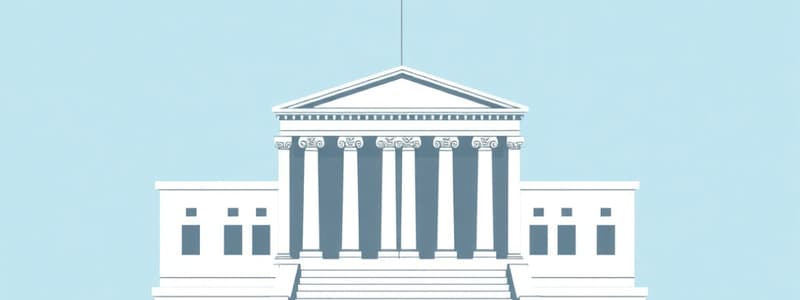Podcast
Questions and Answers
Which branch of government is responsible for interpreting laws?
Which branch of government is responsible for interpreting laws?
- Legislative Branch
- Executive Branch
- Judicial Branch (correct)
- Constitutional Branch
What is the primary function of the Legislative Branch?
What is the primary function of the Legislative Branch?
- Conduct foreign affairs
- Interpret laws
- Enforce laws
- Make laws and manage budgets (correct)
What is the meaning of 'veto' in the context of government?
What is the meaning of 'veto' in the context of government?
- To appoint judges
- To pass a law
- To reject a proposed law (correct)
- To interpret a law
Which form of government allows citizens to vote directly on laws?
Which form of government allows citizens to vote directly on laws?
Which branch of government can override a presidential veto?
Which branch of government can override a presidential veto?
What type of government is characterized by absolute power held by one leader?
What type of government is characterized by absolute power held by one leader?
Which country exemplifies a constitutional monarchy paired with representative democracy?
Which country exemplifies a constitutional monarchy paired with representative democracy?
What is the purpose of the system of checks and balances in government?
What is the purpose of the system of checks and balances in government?
Flashcards
Executive Branch
Executive Branch
The branch of government that executes and enforces laws. This branch includes the President and their executive team.
Legislative Branch
Legislative Branch
The branch of government responsible for making laws, controlling budgets, and overseeing the government's operations. This branch includes the Congress (Senate and House of Representatives).
Judicial Branch
Judicial Branch
The branch of government that interprets laws, determining whether they are constitutional. This branch includes the Supreme Court.
Checks and Balances
Checks and Balances
Signup and view all the flashcards
Democracy
Democracy
Signup and view all the flashcards
Autocracy
Autocracy
Signup and view all the flashcards
Oligarchy
Oligarchy
Signup and view all the flashcards
Theocracy
Theocracy
Signup and view all the flashcards
Study Notes
Branches of Government
- Executive Branch: Enforces laws; examples include the President (U.S.) and Prime Minister (other nations); key powers include vetoing laws, appointing officials and judges, and conducting foreign affairs.
- Legislative Branch: Creates laws and manages budgets; examples include Congress (Senate and House of Representatives in the U.S.); key powers include overriding presidential vetoes, approving/rejecting appointments, and impeaching the president or judges.
- Judicial Branch: Interprets laws; examples include the Supreme Court; key powers include declaring laws and executive actions unconstitutional.
Checks and Balances
- Definition: Ensures no branch of government becomes too powerful.
- Examples: The president can veto a law (Executive checks Legislative). Congress can override the veto (Legislative checks Executive). Courts can strike down unconstitutional laws or executive actions (Judicial checks both branches).
Forms of Government
- Democracy: Citizens hold political power.
- Direct Democracy: Citizens vote directly on laws (e.g., Ancient Athens).
- Representative Democracy: Citizens elect representatives (e.g., U.S., Brazil).
- Autocracy: Power held by one person.
- Monarchy: Power passed through a family line (e.g., Saudi Arabia).
- Dictatorship: Absolute power held by one leader (e.g., North Korea).
- Oligarchy: A small group holds power (e.g., apartheid South Africa).
- Theocracy: Government based on religious authority (e.g., Iran).
- Anarchy: No government; state of lawlessness.
Government Systems Examples
- Switzerland: Combination of direct and representative democracy.
- Denmark: Constitutional monarchy and representative democracy.
- Saudi Arabia: Monarchy and theocracy.
- Brazil: Representative democracy.
- South Africa (apartheid era): Oligarchy and representative democracy.
- North Korea: Dictatorship.
Key Vocabulary
- Veto: The power to reject a proposed law.
- Constitution: A legal document outlining government structure and citizen rights.
- Supreme Court: The highest judicial authority.
- Autocracy, Oligarchy, Theocracy, Democracy: Defined and examples given above.
- Direct vs. Representative Democracy: Explained and exemplified above.
Study Tips
- Understand definitions of government forms and branches.
- Memorize examples of government systems (e.g., North Korea, Switzerland).
- Review details of checks and balances.
- Practice comparisons (like direct vs. representative democracy).
- Analyze hypothetical scenarios of governance under different systems.
Focus Areas for Long-Answer Questions
- Checks and Balances: Describe its role in preventing power abuse, including examples of branch interactions.
- Direct vs. Representative Democracy: Understand pros and cons, and form an opinion on which is more effective in modern times.
Studying That Suits You
Use AI to generate personalized quizzes and flashcards to suit your learning preferences.
Description
Explore the three main branches of government: Executive, Legislative, and Judicial. Understand their powers and the system of checks and balances that prevents any one branch from becoming too powerful. This quiz will test your knowledge on how these branches interact and function.





